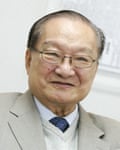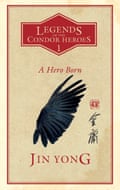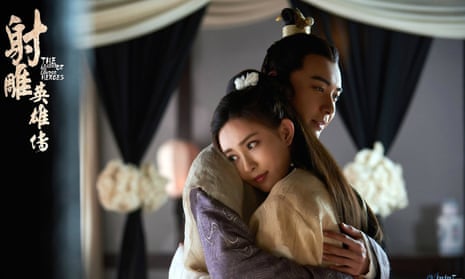Guo Jing, a young soldier among the massed ranks of Genghis Khan’s invading army and son of a murdered warrior, may soon become as familiar a questing literary figure as Frodo Baggins from Tolkien’s Lord of the Rings, or Jon Snow from Game of Thrones. In fact, this Chinese fighting hero is already part of phenomenon that can match both of those epics in size. For the books of Guo Jing’s creator, the author known as Jin Yong, have already sold more than 300m copies.
The world’s biggest kung fu fantasy writer, Jin Yong enjoys huge popularity in the Chinese-speaking world. In the west, however, his name is barely known, largely due to the complexity of the world he has created and the puzzle that has posed for translators.
Now, for the first time, the beginning of his extraordinarily popular series, Legends of the Condor Heroes, has been translated into English for a mainstream readership. It is a task that has already defeated several translators, yet Anna Holmwood, 32, from Edinburgh has managed it – or at least the first volume. Her British publisher, MacLehose Press, plans a 12-volume series, with Holmwood’s first volume, A Hero Born, due out in February.

Agent Peter Buckman, who sold the rights to the series to the publisher, came across the works almost by chance as he searched the internet for “bestselling authors”. “Jin Yong was in the top 10, though I’d never heard of him; nor did I read Chinese,” he said this weekend.
Comparisons with Tolkien or George RR Martin might sound overblown, but in China, Hong Kong, Vietnam and Taiwan, Jin Yong’s works are classics, loved like fairytales or national legends.
“These books are read by so many Chinese people when they are teenagers, and the work really stays in their heads,” Holmwood told the Observer. “So, of course, I felt a great weight of responsibility in translating them – and even more as publication draws near.”
Set in China in 1200, A Hero Born tells of an empire close to collapse. Under attack from the Jurchen Jin dynasty, the future of the entire Chinese population rests in the hands of a few lone martial arts exponents. A novel in the wuxia, or fighting hero, tradition, it was written under the pen name Jin Yong by Chinese journalist, Louis Cha Leung-yung. A founding editor of the Hong Kong daily newspaper Ming Pao, in the 1950s he put together a set of stories charting the progress of a young martial arts fighter during the Song dynasty and serialised them. The plots were fictional but the historical background was real.
They became the biggest Chinese publishing hit of the last century. Cha, who is now 93 and lives in seclusion, created a vast imaginary world over 15 novels, which spawned films, games, comics and television shows.

Buckman bought the rights and sold them on to a British publisher after meeting Holmwood and discovering how little of the series was available in English. “Anna did a sample chapter of the first of the Condor Heroes books and I sent it out to various publishers. My old friend Christopher MacLehose, who specialises in translated masterpieces, had discovered from a Chinese friend how Jin Yong’s work was like Simenon’s is to the French or Tolstoy’s to the Russians – a part of the common culture, with one generation of readers passing on their enthusiasm to the next,” he said.
Although there have been academic translations published over a decade ago, including an edition of The Deer and the Cauldron translated by John Minford, attempts to tackle the wider work have been abandoned. Holmwood, who studied Chinese at Oxford University, first discovered the book in Taipei and later moved to Hangzhou, in east China, while she worked on her translation.
Fellow translators are now being drafted in to help with the task, but the challenge facing all of them is to faithfully represent the kung fu moves along with the Chinese philosophies and religions that are all woven through the plot. Even the fighting skill of the warrior in A Hero Born, for instance, which literally translate as “the 18 palm attacks to defeat dragons”, is in fact derived from a Taoist classic ascribed to Lao Tzu, dating from 2,500 years ago, and has a strong philosophical element in addition to movement.
“I am of the belief that a lot of readers like a bit of a challenge as they go along,” said Holmwood, who now lives in Malmö, Sweden, with her Taiwanese husband and son. That is why fans of Lord of the Rings try to learn Elvish. So I don’t explain everything, although I have written a very short prologue to introduce some of the elements of the story.”

Comments (…)
Sign in or create your Guardian account to join the discussion